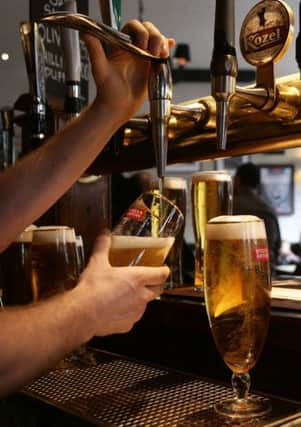Bill Jamieson: Minimum pricing, maximum fuss


These are the core issues raised by last week’s ruling of the European Court of Justice on Scotland’s case for a minimum unit price for alcohol (MUP). It said such a policy is contrary to EU law if other tax options exist.
Under the plans, the cheapest bottle of wine (9.4 units of alcohol) would be £4.69 and a four-pack of 500ml cans of 4% lager would cost at least £4. It would mean a 70cl bottle of whisky could not be sold for less than £14.
Advertisement
Hide AdAdvertisement
Hide AdThe ruling may have implications for other so-called “nudge” taxes designed to change behaviour, such as for example the mooted sugar tax.
It may have settled one issue – the view of the European Court. But it has set other hares running. Not least of these is how governments can impose penalties, short of an outright tax, to encourage us to make “better lifestyle choices” and the role of courts in determining tax policy.
The concern of the European Court is that “the effect of the Scottish legislation is significantly to restrict the market, and this might be avoided by the introduction of a tax measure designed to increase the price of alcohol instead of a measure imposing a minimum price per unit of alcohol.”
It went on to say that it is up to the national court to determine whether measures other than that provided for by the Scottish legislation, such as increased taxation on alcoholic drinks, “are capable of protecting human life and health as effectively as the current legislation, while being less restrictive of trade in those products within the EU.” But one might well ask, what is the point of a health tax if it does not restrict trade?
Libertarians believe that government should not be in the business of using tax or near substitutes to tax – to force people into eating or drinking differently. Conservatives are generally opposed to “nanny state” regulation though some believe MUP is a fair and legitimate means of saving public money in the longer term if we make healthier choices. At the same time, Labour’s left-wing shadow chancellor John McDonnell, for example, is opposed to such taxes.
Then there are practical issues. Would a straightforward increase in alcohol tax be as effective a substitute in changing behaviour as Minimum Unit Pricing? Scotland’s Health Secretary Shona Robison argues that minimum unit pricing “is the right measure for Scotland. We believe it is the most effective mechanism for tackling alcohol misuse and reducing the harm that cheap, high-strength alcohol causes our communities… [it] would target heavy drinkers as they tend to drink the cheap, high-strength alcohol that will be most affected by the policy.”
Alison Douglas, chief executive of Alcohol Focus Scotland, said the ruling showed Scotland would be able to introduce minimum pricing “provided it is more effective than taxation”. She argues that minimum pricing is a better measure than alcohol taxes, which are “limited in their ability to raise the price of the cheapest alcohol to a level that will actually reduce harm”.
And then there is the constitutional dimension. Scotland’s troubled relationship with alcohol is long known and well documented. Could an extra alcohol tax introduced by the Scottish government on health grounds trump the current settlement under which alcohol taxes are a reserved matter for the UK parliament alone to decide? Sceptics say the whole point of MUP was to muddy the waters on Westminster’s control of sin taxes and secure a Scottish point of entry.
Advertisement
Hide AdAdvertisement
Hide AdSo this is far from being the end of the matter. It will now return to the Court of Session in Edinburgh. Scottish judges will have to determine whether improvements in public health – the mooted aim of MUP – could be achieved by other means, such as simply hiking tax rates. And beyond that, an appeal to the Supreme Court could well follow.
The debate also has resonance for advocates of a proposed sugar tax to tackle obesity. It could oblige supporters to opt for a ban on drinks with excessive sugar content rather than a tax that could run into similar European Court objections.
Earlier this month the House of Commons Health Select Committee called for a sugar tax as part of a wide raft of proposals it would like to see the government introduce. It advocated nine different actions including strong controls on price promotions of unhealthy food and drink, a “centrally led reformulation programme” to reduce sugar in food and drink and a sugary drinks tax on full sugar soft drinks to help change behaviour.
However, the Public Health England report on which the findings were based lacked evidence that a sugar tax would lead to any meaningful reduction in consumption, or whether it would reduce obesity if it did reduce consumption of sugar.
Then there is the tax advocate’s nightmare – behavioural response. Academic evidence suggests that even where it does reduce consumption of the specific good taxed, this is offset by the substitution effect. Any reduction in calorie consumption is negligible if even present. When Denmark introduced its widely condemned fat tax it proved economically damaging, but had very little impact on the consumption of “unhealthy food”. Some 80 per cent of Danes made no change to their shopping habits.
Minimum Unit Pricing has turned out to be a far more complex issue than its advocates allowed for. The health evidence has to be weighed and the behavioural responses considered. A court of law may rule on the legal position of the Scottish Government. But that is far from the end of the matter.